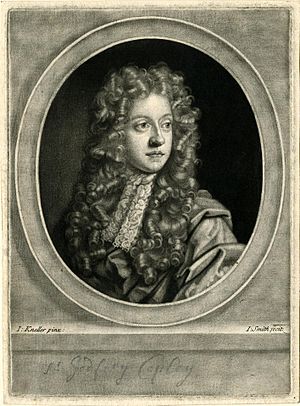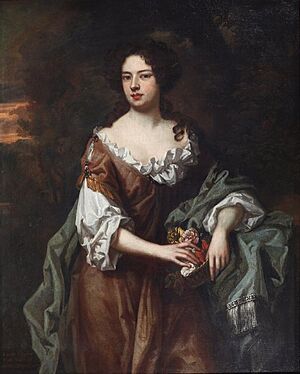Sir Godfrey Copley, 2nd Baronet facts for kids
Quick facts for kids
Sir Godfrey Copley, 2nd Baronet
|
|
|---|---|
 |
|
| Born | c. 1653 |
| Died | 9 April 1709 |
| Occupation | Politician |
| Spouse(s) | Catherine Purcell, Gertrude Carew |
| Children | Catherine Copley |
| Parent(s) | Sir Godfrey Copley, 1st Baronet Eleanor Walmesley |
| Awards | Fellow of the Royal Society |
Sir Godfrey Copley, 2nd Baronet, was an important English landowner and politician who lived from about 1653 to 1709. He was known for his home, Sprotbrough House, near Doncaster in Yorkshire. He served in the English and British Parliaments for many years. Today, he is most famous for creating the Copley Medal, a very old and respected award for scientific achievements.
Early Life and Family
Godfrey Copley was born around 1653. His father, also named Sir Godfrey Copley, was made a baronet by King Charles II of England in 1661. A baronet is a special title, like a knight, that can be passed down in a family. His mother was Eleanor Walmesley.
When his father passed away in 1678, young Godfrey inherited the title of baronet and all the family's lands. He also took over his father's job as the High Sheriff of Yorkshire for a short time. He owned a lot of land in places like Sprotbrough, Doncaster, and Bentley.
Political Career
Sir Godfrey Copley became a Member of Parliament (MP) for Aldborough in 1679. An MP is someone elected to represent people in the country's Parliament, where laws are made. He served in Parliament until 1685.
In 1681, he married Catherine Purcell. After she passed away, he married Gertrude Carew in 1700.
Sir Godfrey was also interested in science and learning. He became a member of the Royal Society in 1691. This is a famous group of scientists. He often met with important people in London to discuss politics and other topics.
He was elected as an MP again for Thirsk in 1695. He cared a lot about money and how it was used in the country. He also worked on local projects, like trying to make the River Don easier for boats to travel on.
Copley continued to be elected to Parliament in the early 1700s. He focused on important issues like how the government spent money and how the army was managed. He was even chosen to help control the army's accounts in 1704. In 1709, he helped write new laws about treason and stopping French goods from coming into the country.
Death and Lasting Gift
Sir Godfrey Copley passed away on April 9, 1709, after a short illness. He was buried in Sprotbrough. He had one daughter, Catherine, but no sons. This meant that when he died, his title of baronet ended. His lands eventually went to his grandson, Joseph Moyle, who later changed his name to Copley and also became a baronet.
Sir Godfrey Copley is best remembered for a generous gift he left in his will. He gave £100 to the Royal Society. This money was used to create an annual award called the Copley Medal. This medal is given to scientists for outstanding achievements in natural knowledge. It is Britain's oldest science award and is considered a very important prize, much like a forerunner to the Nobel Prize.
 | Precious Adams |
 | Lauren Anderson |
 | Janet Collins |



